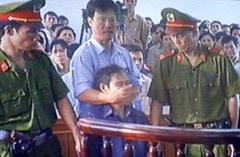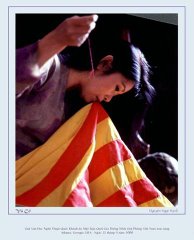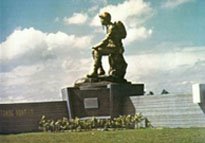June 19, 2007
Times Staff Writer, By Mike Anton / Times Staff Writer
...Triet would become the first president of Vietnam to visit the United States since the Vietnam War ended in 1975. He would meet President...1975 that never stopped," he added. Vietnam has improved relations with the United States... / Times Staff Writer
News travels fast in Orange County's Little Saigon. So do rumors. The hottest one began coursing through the community a couple of months ago.
Word was Nguyen Minh Triet would become the first president of Vietnam to visit the United States since the Vietnam War ended in 1975. He would meet President Bush at the White House in late June and travel to California. He might even stop in Little Saigon.
This raised the collective blood pressure of a community where the war is still being fought. More rumors followed: Triet had canceled the trip. The trip was back on. He would stop in Los Angeles but not come to Little Saigon.
"Two hours ago, I got a call from a source in Hanoi," Thai Dinh, who hosts a talk show on Little Saigon Radio, said last week. "He will be in Orange County about 11 a.m. Saturday…. It will be a very quiet visit. He knows if he announced that, he'd be faced with thousands and thousands of people protesting."
Triet's trip and his scheduled meeting Friday with Bush — largely unnoticed by most Americans — has been the talk of Little Saigon for weeks. Every dollop of information is scrutinized by the competitive Vietnamese-language media — three daily newspapers, dozens of weekly publications, two TV channels, a half-dozen radio stations.
At least two committees have been formed to marshal a response should Triet come to Little Saigon.
The ubiquitous chatter underscores how information ricochets through Little Saigon like it does in any small town. Secrets are hard to keep here, even if they are state secrets.
"I'm in government, work on foreign affairs, and I didn't hear anything about [President Triet's trip] until I heard it from people in the community," said Khoi Ta, an aide to U.S. Rep. Loretta Sanchez, whose district encompasses part of the nation's largest Vietnamese American enclave.
"It's part of one long discussion that started in 1975 that never stopped," he added.
Vietnam has improved relations with the United States in recent years, in part by releasing dissidents and loosening restrictions on religious freedoms leading up to Bush's visit last November to Hanoi.
Since then, there's been tension over the arrest of pro-democracy advocates. White House officials said Bush plans to urge Triet to continue to improve the country's human rights record and implement economic reforms.
"Vietnam has come a long way, but there is still more to be done to protect the rights of its people," National Security Council spokesman Gordon Johndroe said.
Michael Green, who served as Bush's senior advisor on Asian affairs at the NSC until 2005, said Vietnam is eager to improve relations with the United States for both economic and strategic reasons.
"Basically, the Vietnamese want to keep momentum going in the relationship, and that helps them become a modern country," Green said.
The Socialist Republic of Vietnam has touted Triet's meeting with Bush and congressional leaders as evidence of closer ties. However, details of his visit to Southern California haven't been released, and Vietnam's embassy in Washington did not return a phone call Monday.
Visiting Vietnamese government officials have long stirred passions in Little Saigon, where the flag of a country that no longer exists — South Vietnam — is revered.
In 2002, a Vietnamese trade delegation was stalked by angry protesters who forced them to cancel a meeting and abandon their hotel. Two years later, Communist Party leaders scrapped a motorcade through Little Saigon after police said they couldn't ensure their safety. They came to Orange County, but quietly.
Westminster and Garden Grove passed ordinances opposing visits of Vietnamese government officials and requesting the State Department to give advance notice if one should occur.
"It would be like Osama bin Laden visiting New York City," Westminster Councilman Andy Quach said of the prospect that Triet would come to Little Saigon. "Our sources say he's keeping his plans top secret…. Unless they make it an issue, we won't."
Yet the no-Communist zone ordinances are more symbolic than enforceable.
Vietnamese officials routinely come to Little Saigon, mostly for private meetings to discuss burgeoning trade between the two nations.
When they do, a cat-and-mouse game plays out behind the scenes.
"Anything that buzzes around here — let me tell you, it gets around," said Diem Do, chairman of Vietnam Reform Party, one of several anti-Communist groups active in Little Saigon.
When Vietnam's foreign minister visited Los Angeles in March, the location of an unpublicized meeting with businessmen was moved repeatedly and invitees told where to go just hours in advance, Do said.
A month later, word spread that a group of men — clearly outsiders — were scouting potential venues for Triet if he came to Little Saigon.
"The leadership of Vietnam largely comes from the country's north and they have a different accent, a different demeanor," Do said. "When they walk into some place like the Asian Garden Mall, people's radar goes up. Call it intuition. But people can easily spot these folks and these things always leak out."
On Monday, Do said the latest word was Triet will host a brunch Saturday morning in south Orange County, miles from Little Saigon. He will then meet with Vietnamese American businessmen in Irvine and Santa Ana. By afternoon, the location had changed to Newport Beach.
Apparently Triet won't come to Little Saigon after all.
"But that's not set in stone," Do said, noting it was early in the week. "That may change."



























